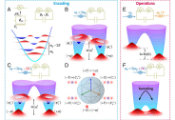Qilimanjaro Quantum Tech Expands Product Portfolio With QiliSDK: A Unified Toolkit for Digital, Analog, and Hybrid Quantum Workflows
Barcelona, Spain, October 22, 2025 -- Qilimanjaro Quantum Tech today announced the release of QiliSDK, an open-source Python framework, that unifies digital, analog, and hybrid quantum algorithm design within a single, intuitive environment. The modular design of the software development kit (SDK) streamlines the algorithm development process and enables easy integration with a variety of quantum platforms.
The SDK represents a significant expansion of Qilimanjaro’s product portfolio, reinforcing its commitment to providing versatile, full-stack tools for practical quantum computing.
As the entry point to Qilimanjaro’s multimodal quantum data center, the first in the world to tightly integrate superconducting digital QPUs, analog QPUs, and classical HPC accelerators within a unified framework, QiliSDK connects users directly to the heart of Qilimanjaro’s infrastructure. This integration enables researchers and developers to prototype, execute, and optimize quantum workflows across both simulation and real hardware, from CPUs and GPUs to Qilimanjaro’s own superconducting QPUs via the SpeQtrum platform.
“Our goal with QiliSDK is to make the process of designing quantum algorithms streamlined across all paradigms: circuit-based, Hamiltonian-based, or hybrid,” said David Arcos, Director of Software at Qilimanjaro Quantum Tech. “This toolkit empowers users to move effortlessly from simulation to real hardware with complete transparency and control.”
The modular architecture of QiliSDK provides high-level abstractions for gates, circuits, Hamiltonians, and optimizers, while remaining fully backend-agnostic. Its expressive syntax supports Pauli algebra, variational programs, and visualization tools that streamline the entire quantum development cycle.
Key capabilities include:
- Unified quantum workflow API for digital, analog, and hybrid computation.
- Coherent backend switching between CPU, GPU, and QPU through integrated backends (e.g., CudaBackend, Qilimanjaro SpeQtrum devices).
- Built-in visualization of circuits and schedules.
- Variational Program interface for hybrid quantum–classical optimization.
- Model toolkit for complex mathematical and optimization models.
The next iterations of QiliSDK will extend its capabilities with pulse programming, digital-analog hybrid workflows, and noise-aware simulation, ensuring robust, cross-stack interoperability via OpenQASM 3.0 / QIR support.
Qilimanjaro continues to pioneer practical quantum advantage through its analog co-design philosophy, and QiliSDK stands as a key enabler of that mission, bridging the gap between theory, simulation, and hardware.
Analog quantum computers encode complex problems naturally within the system, resulting in more stable qubits and fewer errors at the circuit level. This bypasses the error correction required by the more common digital systems which use programmable qubits and quantum gates. Using a multimodal approach of analog QPUs, digital QPUs and classical supercomputers, Qilimanjaro’s platform is designed to maximize the utility of each system to unlock real computational value years ahead of digital-only roadmaps. QiliSDK opens the door for quantum software developers to access this value through Python syntax and high-level abstraction.




































